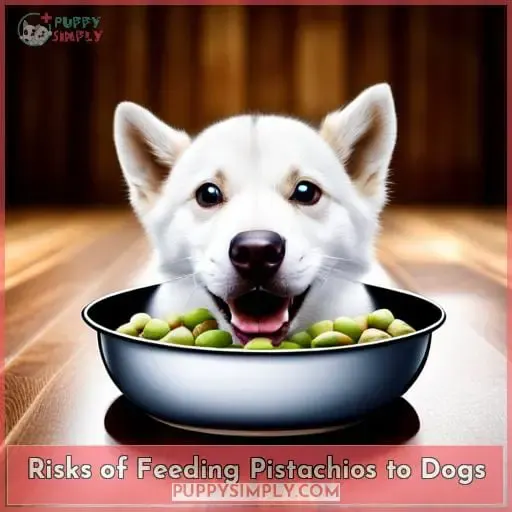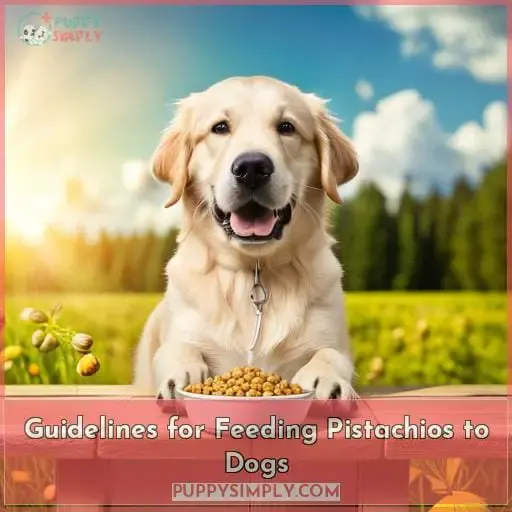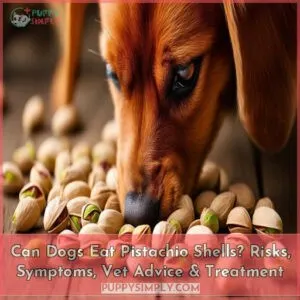This site is supported by our readers. We may earn a commission, at no cost to you, if you purchase through links.
 Do you have a curious pup who loves to explore your snacks? If so, it’s time to put pistachios on the ‘no’ list. Your dog may beg and plead for one of these tasty treats, but as their guardian it’s up to you to keep them safe from harm.
Do you have a curious pup who loves to explore your snacks? If so, it’s time to put pistachios on the ‘no’ list. Your dog may beg and plead for one of these tasty treats, but as their guardian it’s up to you to keep them safe from harm.
Can dogs eat pistachio nuts? As tempting as they may be, the answer is not an outright yes or no – there are certain risks involved that need consideration first.
Pistachios can be choking hazards due to their small size and hard shells. Plus, they contain high levels of fat which could cause pancreatitis in some cases.
Table Of Contents
- Key Takeaways
- Risks of Feeding Pistachios to Dogs
- What to Do if Your Dog Eats Pistachios
- Can Dogs Eat Pistachio Shells?
- Can Dogs Eat Pistachio Ice Cream?
- Guidelines for Feeding Pistachios to Dogs
- Other Nuts Dogs Should Avoid
- Importance of Proper Nutrition for Dogs
- Frequently Asked Questions (FAQs)
- Are there any health benefits to feeding my dog pistachios?
- Are there any special ways to give my dog pistachios to make them safer?
- Is there anything special I should look for when shopping for pistachios for my dog?
- Are there any other nuts that are safer for my dog than pistachios?
- Are there any other treats that are healthier for my dog than pistachios?
- Conclusion
Key Takeaways
- Pistachios are a choking hazard, and their shells should be removed before serving.
- The high fat content in pistachios increases the risk of pancreatitis, so the portion size should be limited based on the dog’s size.
- Pistachios can contain toxins like aflatoxin from mold, which can cause lethargy, vomiting, and liver issues.
- Dogs can have allergies to pistachios, which can lead to gastrointestinal distress.
Risks of Feeding Pistachios to Dogs
Feeding pistachios to dogs may seem like a harmless treat; however, it can cause serious issues due to its choking hazard and the risk of pancreatitis. In addition, there are toxic components such as aflatoxin from mold, which could lead to lethargy, vomiting, or liver problems.
Therefore, it is important for dog owners to be aware of these risks before feeding their pet this type of nut.
Choking Hazard
You should be aware that pistachio shells can pose a serious choking hazard for your pup, so take extra care to remove them before feeding. Shells of nuts like black walnuts and pistachios are especially hazardous due to their hard texture.
The risk increases if they’re too big or have sharp edges, so breaking the shells into smaller pieces is strongly recommended when giving these treats to your dog.
Pancreatitis Risk
Be mindful that indulging your pup with pistachios can lead to pancreatitis due to their high fat content; it could be a slippery slope.
- Aflatoxin poisoning from mold
- Pancreatitis risk caused by the high fat content
- Lethargy and vomiting from Urushiol allergy
Monitor for signs of distress, or better yet, avoid serving altogether!
Toxic Components
Apart from the risk of pancreatitis, pistachios contain aflatoxin – a mold that can cause liver issues and provoke an Urushiol allergy.
What to Do if Your Dog Eats Pistachios
If your pet has consumed pistachios, it’s important to monitor them for symptoms such as diarrhea, vomiting, choking, and lethargy. If any of these signs develop or worsen quickly, seek help from a veterinarian right away.
Additionally, you can contact the Pet Poison Helpline (1-855-764-7661) for advice on how to manage gastrointestinal upset that may have been caused by consuming pistachios.
Due to its high fat content, there is an increased risk of developing pancreatitis in dogs who consume large amounts. So, be sure not to confuse it with poison ivy, which looks very similar and requires different treatment techniques if ingested.
To avoid potential health risks associated with feeding your dog pistachio nuts:
- Remove shells before giving them.
- Crush nuts into small pieces.
- Limit serving size based on the size of the dog – no more than one or two at a time.
- Serve plain without added salt.
- Store them properly in airtight containers to prevent mold growth.
- Consider healthier treats like nutritious high fiber/protein foods instead.
Can Dogs Eat Pistachio Shells?
When it comes to feeding your dog pistachios, the shells are a definite no-no. The reason is that they’re hard and sharp, posing a risk of choking or intestinal blockage if ingested. In addition, they contain high levels of toxins such as urushiol and aflatoxin, which can cause an allergic reaction in dogs when consumed in large amounts.
Urushiol is also found on poison ivy plants, so keep an eye out for any potential ingestion issues there too! If this happens, consult a veterinarian immediately for proper treatment.
It’s important to note that not all kinds of nuts are suitable for canine consumption either, especially those containing high fat content like pistachios. This increases the risk of pancreatitis developing from overconsumption. To ensure your pet remains safe, always consult with your dog’s veterinarian before introducing them into their diet.
Alternatively, consider opting for healthier alternatives like nutritious high fiber/protein foods available at most pet stores these days.
Can Dogs Eat Pistachio Ice Cream?
It’s best to avoid feeding your pup pistachio ice cream, as it contains high levels of fat which could lead to obesity and pancreatitis. The aflatoxin found in the nuts is another potential risk factor for consuming this treat; if ingested, it can cause allergic reactions, vomiting, and lethargy.
Here are some important considerations when thinking about giving your pup pistachio ice cream:
- Consult with your dog’s veterinarian before introducing anything new into their diet.
- Opt for healthier alternatives like nutritious high fiber/protein foods available at most pet stores these days instead of nut-based treats.
- Be aware that pistachios contain urushiol which may result in an allergic reaction if consumed in large amounts or by sensitive dogs – monitor carefully!
- Remember that even though small servings may be ok for some dogs, there is still a risk of developing pancreatitis from overconsumption so take care not to give too much at once.
When deciding whether or not you should feed your canine companion pistachio ice cream, remember the risks involved with consuming aflatoxin and how they can impact their safety and overall health long term – always err on the side of caution when possible!
Guidelines for Feeding Pistachios to Dogs
If you’re considering feeding your pup pistachios, it’s important to keep in mind the potential health risks. While small servings may be ok for some dogs, their high fat content can cause obesity and pancreatitis if eaten in large amounts.
Additionally, aflatoxin found on the nuts can cause allergic reactions or vomiting when consumed by sensitive dogs.
To avoid any intestinal blockage from shells being swallowed whole, always remove them before serving and crush the nut up into smaller pieces depending on the size of the dog breed/age – one or two at most is recommended! It’s also wise to consult with professional veterinarian services about introducing new foods into their diet as well as monitoring for any signs of health issues once ingested.
Other Nuts Dogs Should Avoid
Aside from pistachios, there are other nuts that you should avoid feeding your pet to prevent potential health risks.
- Walnuts – which contain high levels of aflatoxin and can lead to pancreatitis risk in some dogs.
- Almonds – with their high fat content, can cause digestive issues if not properly digested.
- Cashews – as they may make dogs sick or weak due to their low levels of essential fatty acids.
Always research any unfamiliar food before giving it to your pup and consider healthier alternatives such as supplements or specially formulated dog foods. Remember when introducing new treats into the diet, do so gradually while monitoring for signs of illness like vomiting and diarrhea since pistachios’ high fat content could be harmful for some breeds.
When in doubt, consult with a professional veterinarian beforehand!
Importance of Proper Nutrition for Dogs
Providing your pup with proper nutrition is essential for their long-term health and happiness, so be sure to do your research before adding any new snacks into the mix! A well-balanced diet of high-quality dog food should form the basis of a healthy canine lifestyle.
Avoiding people foods as much as possible will help ensure safety in terms of what may or may not agree with their stomachs.
Table 1 below outlines some key points to consider when feeding a dog:
| Dog’s Safety | Dog’s Stomach | Well-Balanced Diet |
|---|---|---|
| Check ingredients/allergens carefully | Start slowly – introduce one at a time & monitor reaction | |
| Aim for balanced nutrient proportions (protein, fat, carbohydrates) | ||
| Feed appropriate portion sizes according to size and breed | ||
| Provide variety within meals such as vitamins & minerals from vegetables and other sources |
People foods can cause health conditions ranging from pancreatitis risk due to inadequate digestion capacity through tainting by mold toxins or allergies caused by urushiol found in pistachios – you’ll need expert advice on how best to avoid these issues.
Frequently Asked Questions (FAQs)
Are there any health benefits to feeding my dog pistachios?
No, there are no health benefits from feeding your dog pistachios. In fact, they can be harmful due to their high fat content and potential for mold-causing toxins. Monitor closely for signs of illness if you do give them as a treat; otherwise, opt for healthier options like nutritious food or supplements.
Are there any special ways to give my dog pistachios to make them safer?
To make pistachios safer for your pup, remove the shells and crush them. Limit to 1-2 nuts maximum depending on their size and ensure they are plain, unsalted. Store them properly so that mold does not form; otherwise, aflatoxin can cause liver issues or allergy-like sickness.
Is there anything special I should look for when shopping for pistachios for my dog?
When shopping for pistachios, look for unsalted, plain nuts. Remove shells before giving them to your dog and always limit them to 1-2 pieces maximum depending on size. Avoid any with mold or signs of aflatoxins and be mindful of the urushiol content, which can cause allergy-like sickness in dogs.
Are there any other nuts that are safer for my dog than pistachios?
Pistachios are not recommended for your pup, but there are other nuts that can provide a safe and healthy treat. Try walnuts, almonds, or peanuts as nutritious alternatives with no salt or shells to worry about.
Are there any other treats that are healthier for my dog than pistachios?
Yes! There are many healthier treats for your pup than pistachios. Consider high-fiber, high-protein dog food or supplements to support their health – no choking hazard and fewer risks of side effects like aflatoxins or urushiol.
Conclusion
It’s natural to want to treat your pup with something special, but it’s best to skip the pistachios. This tasty snack carries a range of risks, including a choking hazard, pancreatitis, and even toxins.
Urushiol and aflatoxin from mold can be particularly dangerous. If your pup has already snacked on pistachios, monitor their behavior and contact a vet if symptoms like diarrhea, vomiting, or lethargy appear.
Pistachio shells should always be avoided, as well as pistachio ice cream, which can contain too much sugar for dogs. As an alternative, opt for nutritious, high-fiber, high-protein dog foods and supplements that will support your pup’s health.
With a bit of care and attention, you can help ensure your pup remains in the best possible condition.













